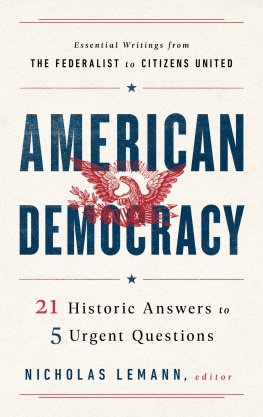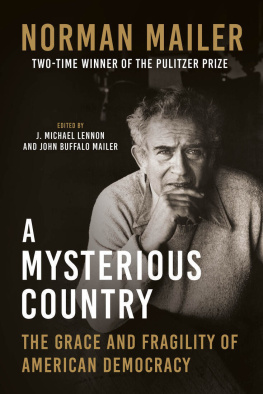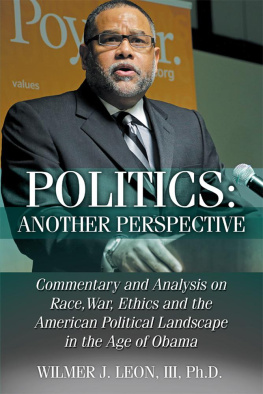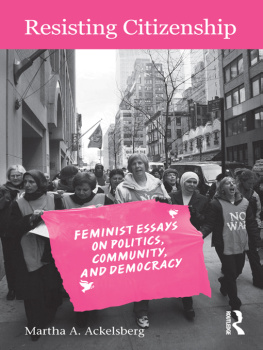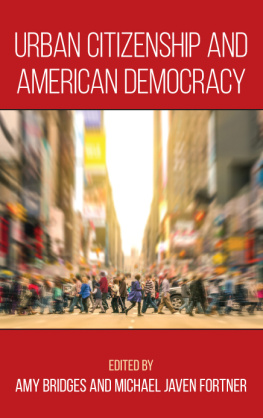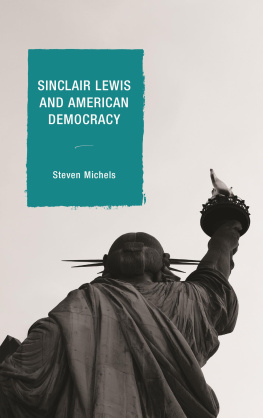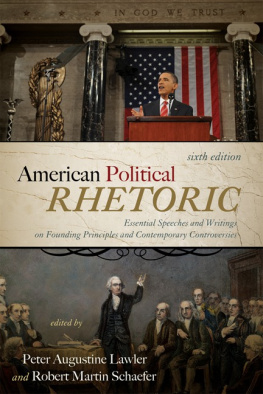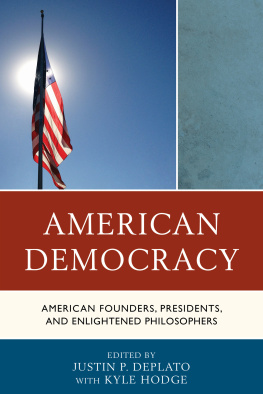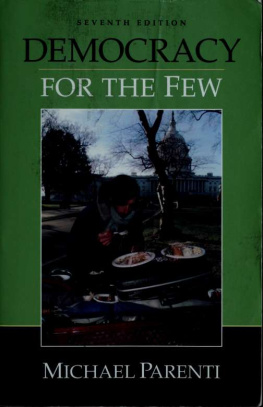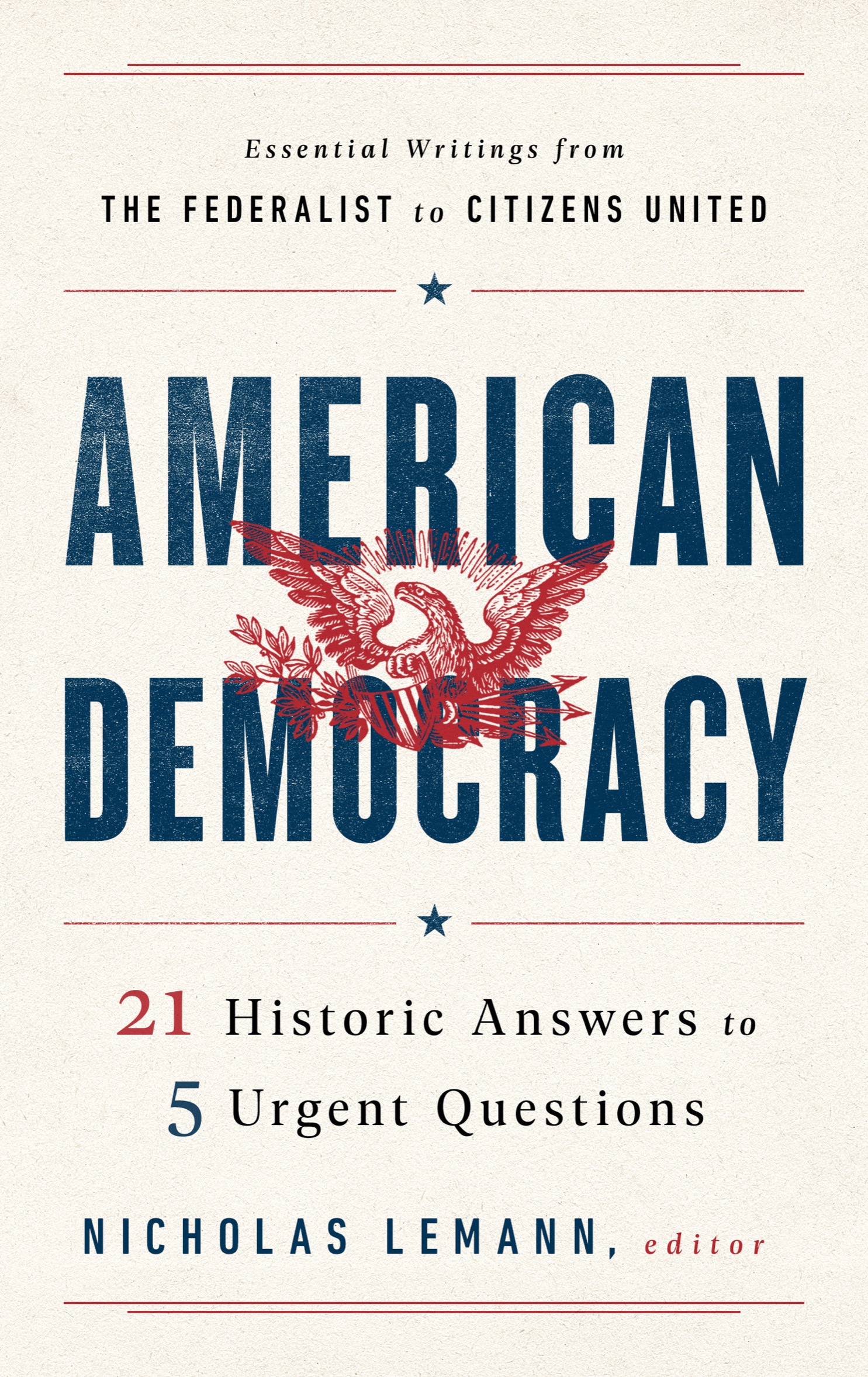

LIBRARY OF AMERICA E-BOOK CLASSICS
AMERICAN DEMOCRACY Copyright 2020 by Literary Classics of the United States, Inc., New York, N.Y. All rights reserved.
No part of this book may be reproduced in any manner whatsoever without the permission of the publisher, except in the case of brief quotations embodied in critical articles and reviews.
Published in the United States by Library of America. Visit our website at www.loa.org.
Excerpt from Black Reconstruction in America, 18601880 by W.E.B. Du Bois. Copyright 1935, 1962 W.E. Burghardt Du Bois. Reprinted with the permission of Scribner, a division of Simon & Schuster, Inc. All rights reserved.
Letter from Birmingham Jail, 1963 by Dr. Martin Luther King, Jr. Copyright 1963 by Dr. Martin Luther King, Jr. renewed 1991 Coretta Scott King. Reprinted by arrangement with The Heirs to the Estate of Martin Luther King, Jr., c/o Writers House as agent for the proprietor.
Civil Disobedience by Hannah Arendt. Copyright 1970 by Hannah Arendt. (Originally appeared in The New Yorker .) Reprinted by permission of Georges Borchardt, Inc., on behalf of Hannah Arendt Bluecher Literary Trust.
Translation of Democracy in America by Alexis de Tocqueville. Copyright 2004 by Literary Classics of the United States, Inc.
Distributed to the trade in the United States by Penguin Random House Inc. and in Canada by Penguin Random House Canada Ltd.
Library of Congress Control Number: 2020933916
eISBN 9781598536638
Contents
Introduction
By Nicholas Lemann
I t is hard to remember a time when people were discussing the future of the United States as a well-functioning democracy, as if that were an open question, as urgently as they are now. The news is full of evidence to make one wonder. The President can, and regularly does, push past the official boundaries of the power of the officeby spending money without congressional approval, selectively enforcing the immigration laws, undermining the independence of federal agencies, and unilaterally ordering assassinations overseas, even of American citizens. It has always been possible for someone who lost the popular vote by a significant margin to win a presidential election, but that has now happened twice in two decades. The Electoral College, and the way representation in the Senate is structured, were designed to give some states political power out of proportion to their population, but the discrepancy between the largest and smallest states is now greater than it has ever been. There are never-ending battles, which we really shouldnt still be having, over who has the right to vote and what obstacles stand in the way of casting a ballot. The outsize political influence of the rich and powerful seems impervious to limitation. The two political parties, which are supposed to function as broad coalitions that have come together to get the governments work done, behave instead like opposing armies bent on annihilating each other. And if democracy implies something beyond elections and the operations of governmentsomething like a universal guarantee of a decently provisioned life, individual opportunity, and personal freedomthen America isnt functioning so well in that way either.
Many of us were raised on a series of bromides about American democracy: Ours is the worlds oldest functioning democracy. The United States provides a model of governance to which the rest of the world aspires. We have a moral obligation to try to bring every other countrys system closer in design to our own. If we are now questioning these comfortable assumptions, that is useful, because they were always automatic and never fully warranted. Our new disquiet about our democracy may be a sign that this is an especially alarming moment, or it may simply be that, for the past few decades, we have been in a kind of national slumber about shortcomings of American democracy that were always there. In that case, looking under the surface of our politics and into the structure in which it takes place is vitally important. The results of political systems are a product of their design, which doesnt usually get the attention it deserves because it isnt immediately obvious.
This book is meant to serve as a tool in the effort to understand American democracythe fundamental challenges that our system faces and the questions it has never been fully able to resolve. The books perspective is historical. It is not very useful, as well see, to think of the United States as a once perfect democracy that only recently went astray. Instead, nearly all the essential aspects of our democracy have been in dispute from the very beginning. That is not meant as a devastating revelation, but, instead, as a prod to ongoing thought and engagement. With the great exception of the Civil War, Americans have been able to agree enough about what our democracy should be for us to continue to function as a single nation. Otherwise we have disagreed vehemently, often violently, about most of democracys major aspects. That will surely continue. To understand some of the major disagreements is a way of preparing yourself to play your own part in the necessary and never-ending struggle over them.
There are twenty-one historical texts in this book, which were originally produced across a long span of time beginning in the eighteenth century and ending in the twenty-first. Any such selection must be partial. You wont find here some texts that are usually considered to be canonical, like the Declaration of Independence, the Gettysburg Address, and Martin Luther Kings I Have a Dream speech. The principle governing the selections is that each one is meant to illuminate an issue that was in dispute when it was produced and is still salient today. Together they are meant to convey the idea that American democracy is dynamic, not staticthat is has changed continuously and will continue to change, sometimes for the better, sometimes not.
The selections are organized around five major and never fully settled questions about American democracy. They are:
Citizenship: Who Are We the People? Democracy literally means, in Greek, rule by the people. The ancient inventors of the term were highly skeptical about it as an ideal, and at the outset of the United States as a nation, democracy was the furthest thing from a global norm. The Framers suspicion of rule by the people was based on the idea that they would be ill-informed, motivated by passion rather than reason, and prone to impose their prejudices too forcefully on people who did not share them. We still hear versions of these concerns. By the standards of their time, the Framers were pushing forward the idea of elected government, but they did so with some caution. Initially, only a small minority of Americans, white and male, had the right to vote, and only one part of the national government, the House of Representatives, was chosen by direct election.
The selections in this section show a gradually ascendant argument for a redefinition of democracy, so that it would entail much wider participation and a more expansive concept of the rights of American citizens. George Washingtons letter to the Hebrew Congregation of Newport announced that in the United States, Jews, and by implication others, would be able to practice their religion freely and openly without being in any way excluded from citizenship. The selections by Frederick Douglass and Elizabeth Cady Stantontowering figures in the nineteenth-century movements to win rights for black people and womenshow the ways the American tradition, exclusionary as it was, could be used rhetorically to argue for more inclusion. The final two selections, by the long-serving Massachusetts senator Henry Cabot Lodge and the early twentieth-century radical intellectual Randolph Bourne, display complete disagreement about a matter that is still deeply in dispute today: In what numbers, and on what political and cultural terms, people from other countries should be permitted to come to the United States? Immigration, voting rights, multiculturalismall these are pressing present-day concerns that are deeply rooted in the historical debates about American democracy.

